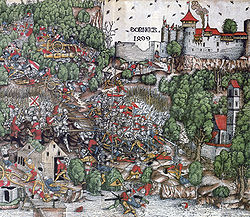Battle of Dornach
| Battle of Dornach | |||||||
|---|---|---|---|---|---|---|---|
| Part of the Swabian War | |||||||
 Contemporary woodcut of the Battle of Dornach |
|||||||
|
|||||||
| Belligerents | |||||||
|
|
|
||||||
| Commanders and leaders | |||||||
| Heinrich von Fürstenberg † | |||||||
| Strength | |||||||
| ca. 6,000 | 16,000 | ||||||
| Casualties and losses | |||||||
| Heavy | Heavy | ||||||
The Battle of Dornach was a battle fought on 22 July 1499 between the troops of Emperor Maximilian I and the Old Swiss Confederacy close to the Swiss village of Dornach. The battle turned into a decisive defeat for Maximilian, and concluded the Swabian War between the Swiss and the Swabian League.
On 19 July, Imperial troops marching on Dornach castle were sighted, and Solothurn called Bern for help. Bern sent 5000 troops, Zurich 400, and smaller contingents from Uri, Unterwalden and Zug also started to move to Dornach. On 20 July, 600 troops left Lucerne. The Austrians had about 16,000 troops. Many of these were bathing in the Birs. The first attacks on 22 July were executed by the troops of Bern, Zurich and Solothurn, but they were beaten back. Only with the arrival of the reinforcements from Lucerne and Zug, which suddenly broke out of the woods "with horns and shouting" were the Imperial troops turned to flight after several hours' fighting.
The commander of the Imperial troops, Heinrich von Fürstenberg, was killed in the early stages of fighting. When Maximilian in Überlingen heard about the lost battle, he was reportedly devastated by the news.
The battle of Dornach was the last armed conflict between the Swiss and any member state of the Holy Roman Empire. The Treaty of Basel of 22 September was the conclusion of the war. It was a strategic victory for the Swiss Confederacy, revoking the imperial ban against the Swiss cantons, legalising the alliance of the League of the Ten Jurisdictions with the Confederates and placing the Thurgau under Swiss jurisdiction.
A relief wall was erected in 1949 in the town of Dornach commemorating the battle.
...
Wikipedia
